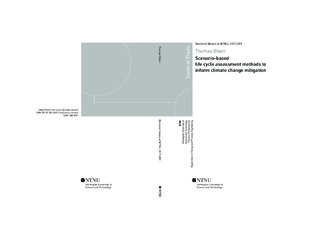| dc.contributor.advisor | Hertwich, Edgar | |
| dc.contributor.advisor | Strømman, Anders Hammer | |
| dc.contributor.author | Gibon, Thomas | |
| dc.date.accessioned | 2017-12-05T09:09:02Z | |
| dc.date.available | 2017-12-05T09:09:02Z | |
| dc.date.issued | 2017 | |
| dc.identifier.isbn | 978-82-326-2647-2 | |
| dc.identifier.issn | 1503-8181 | |
| dc.identifier.uri | http://hdl.handle.net/11250/2469193 | |
| dc.description.abstract | Assessing the health and environmental implications of climate change mitigation, and the shiN in electricity production technologies in particular, requires the proper consideration of technological and regional speciEcities of global energy systems, as well as their interactions with each other. Additionally, it is crucial to quantify all kinds of impacts that their fast and widespread rollout will generate in the upcoming decades, this to ensure that energy policies will not lead to more problems than they try to solve.
With the help of a multiregional, hybrid life cycle assessment (LCA) framework, we have evaluated the health, resource, and environmental costs and co-beneEts of a transition to a global low-carbon electricity system. Ce model built for that purpose, THEMIS (for “technology hybridized environmental-economic model with integrated scenarios”), represents the global economy (based on a multiregional input-output table) and technosphere (based on a process life cycle database) in nine regions, and three years (2010, 2030, 2050) along two scenarios. THEMIS allows practitioners to perform impact assessments of a given system from a single life cycle inventory applied to any region/year/scenario combination. Region-speciEc assessment is particularly necessary for low-carbon technologies whose performance relies on local climatic conditions.
Methodological advances introduced in THEMIS show how deeply energy systems are related to each other. Ce implementation of integrated hybrid inputoutput highlights an important kind of feedback eMect: production of low-carbon systems will decarbonize the economy in which they are produced, which will in turn decrease the carbon intensity of domestic production. Based on this assessment, we posit that the most successful energy policies will consider regional speciEcities, feedback eMects, and co-beneEts. | nb_NO |
| dc.description.abstract | SAMMENDRAG
Vurdering av helse- og miljomessige konsekvenser av klimatiltak generelt, og teknologiskiNet innenfor elektrisitetsproduksjon spesielt, krever riktig behandling av teknologiske og regionale sartrekk ved globale energisystemer, samt deres samspill med hverandre. I tillegg er det viktig a kvantiEsere alle typer konsekvenser som en hurtig og omfattende utrulling av ny energiteknologi vil generere i de kommende tiarene, for a sikre at energipolitikk ikke vil fore til storre problemer enn det prover a lose.
Ved hjelp av et rammeverk basert pa multiregional hybrid krysslopsanalyse (IO) og livslopsanalyse (LCA), har vi vurdert helse-, ressurs- og miljokostnader, samt dobbeltfordelene (eng. co-beneEts) av energiovergangen. Modellen bygget for dette formalet, THEMIS ("teknologi-hybridisert miljookonomisk modell med integrerte scenarier"), representerer den globale okonomien (basert pa den multiregionale krysslopstabellen, eng. multiregional input-output table) og teknosfaren (basert pa en livssyklus-prosessdatabase) for ni regioner og tre ar (2010, 2030, 2050) langs to ulike scenarier. THEMIS tillater brukere a utfore konsekvensutredninger av et gitt system ved a knytte et enkelt livslopsregnskap til en hvilken som helst kombinasjon av region/ar/scenario. Region-spesiEkke vurderinger er sarlig viktige for lavkarbonteknologier der ytelsen avhenger av lokale klimatiske forhold.
Metodologiske fremskritt introdusert i THEMIS viser hvor dypt energisystemer er relatert til hverandre. Implementering av et integrert hybrid krysslopsrammeverk understreker en viktig form for tilbakeslagseMekt: produksjon av lav-karbons energisystemer vil dekarbonisere okonomien der de er produsert, noe som igjen vil redusere karbonintensiteten i innenlandsk produksjon. Basert pa denne vurderingen, hevder vi at den mest vellykkede energipolitikk vil vurdere regionale sartrekk, tilbakekoblingseMekter, og dobbeltfordeler. | nb_NO |
| dc.language.iso | eng | nb_NO |
| dc.publisher | NTNU | nb_NO |
| dc.relation.ispartofseries | Doctoral theses at NTNU;2017:289 | |
| dc.relation.haspart | Paper 1:
Gibon, Thomas; Wood, Richard; Arvesen, Anders; Bergesen, Joseph; Suh, Sangwon; Hertwich, Edgar G..
A Methodology for Integrated, Multiregional Life Cycle Assessment Scenarios under Large-Scale Technological Change. Environmental Science and Technology 2015 ;Volum 49.(18) s. 11218-11226
http://dx.doi.org/10.1021/acs.est.5b01558 | |
| dc.relation.haspart | Paper 2:
Hertwich, Edgar G.; Gibon, Thomas; Bouman, Evert; Arvesen, Anders; Suh, Sangwon; Heath, Garvin; Bergesen, Joseph; Ramirez, Andrea; Vega, Mabel; Shi, Lei.
Integrated life-cycle assessment of electricity-supply scenarios confirms global environmental benefit of low-carbon technologies. Proceedings of the National Academy of Sciences of the United States of America 2015 ;Volum 112.(20) s. 6277-6282
http://dx.doi.org/10.1073/pnas.1312753111 | |
| dc.relation.haspart | Paper 3;
Gibon, Thomas; Hertwich, Edgar G.; Arvesen, Anders; Singh, Bhawna; Verones, Francesca.
Health benefits, ecological threats of low-carbon electricity. Environmental Research Letters 2017 ;Volum 12. s
https://doi.org/10.1088/1748-9326/aa6047
Original content from this work may be used under the terms of the Creative Commons Attribution 3.0 licence. | |
| dc.relation.haspart | Paper 4: Gibon, Thomas; Arvesen, Anders; Hertwich, Edgar G.. Life cycle assessment demonstrates environmental co-benefits and trade-offs of low-carbon electricity supply options. Renewable & Sustainable Energy Reviews 2017 ;Volum 76. s. 1283-1290 https://doi.org/10.1016/j.rser.2017.03.078 | |
| dc.title | Scenario-based life cycle assessment methods to inform climate change mitigation | nb_NO |
| dc.type | Doctoral thesis | nb_NO |
| dc.subject.nsi | VDP::Technology: 500::Environmental engineering: 610 | nb_NO |
